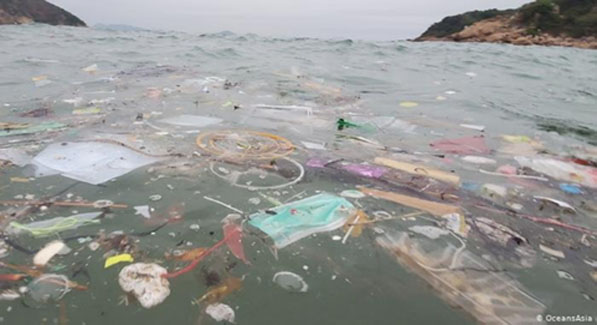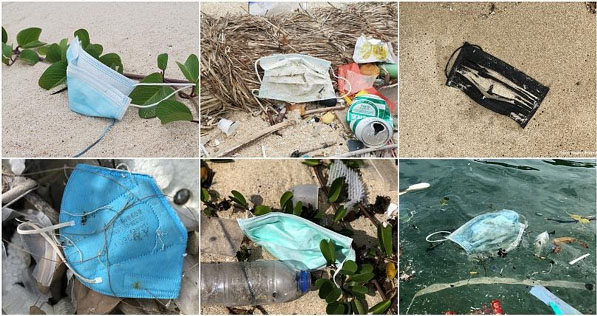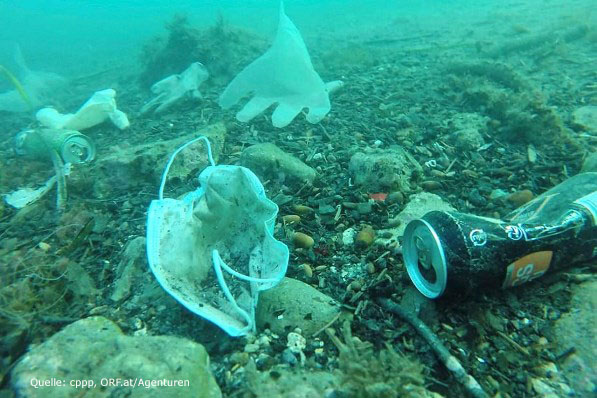From Covid pandemic to plastic waste epidemic
Covid 19, a virus is spreading around the world, causing governments and people alike to hold their breath. A microorganism shows us how it literally turns the world upside down in a very short time.
Leading scientists, the UN, the WWF, the Voice Aid Association as well as internationally known environmental activists warn that this Covid pandemic will develop into a new pandemic, the plastic pollution pandemic, through the purchase of worldwide PPEs (personal protective equipment).
Gloves, masks, disinfectants, disposable gowns are needed everywhere. In hospitals as well as in the retail trade, in retirement homes, in hairdressing salons and numerous other facilities, as well as in every private household.
The plastic flood is unstoppable – it is rolling towards us!
According to estimates by the United Nations Environment Programme (UNEP), more than 8 million tons of plastic are released into the oceans every year. According to a report by the Ocean Conservancy, five states are mainly responsible for this: Vietnam, Thailand, China, Indonesia and the Philippines. Half of the plastic products produced worldwide are disposable, including PPE items.
According to the WWF, 570,000 tons of plastic are disposed of in the Mediterranean every year. This corresponds to 33,800 plastic bottles per minute. In Italy alone, the Turin Polytechnic estimates that during the phase of lifting the initial restrictions, about 1 billion masks and half a billion plastic gloves will be needed per month.

According to another WWF report, the incorrect disposal of only 1% of the masks through distribution in nature results in up to 10 million masks per month polluting the environment.
Plastic waste in particular presents us with special challenges in the Mediterranean, an inland sea. According to a WWF report, 7% of the global microplastics are found in the Mediterranean, although in comparison to the world’s water surface, the Mediterranean only accounts for about one percent. The reasons for this are seen in the lack of recycling in the riparian states. According to the NGO (Non Profit Organisation) only one third of the plastic waste produced is recycled.
From the road to the sea!
If waste – of whatever kind – is disposed of properly, it will end up in a dustbin, otherwise it will end up on the street or sidewalk. If it now falls into a gutter, it ends up in the sewerage system via gullies or, by mixing with rainwater, in the rivers and thus in the oceans. Operation Mer Propre calls on people to behave responsibly and to stop polluting the streets and the environment. It calls for a move away from disposable masks/plastic gloves to reduce pollution at source.
Joffrey Peltier – co-founder of Operation Mer Propre – says: “Of course we have to protect ourselves from Covid-19, but I don’t think plastic is the appropriate solution. We can wear reusable masks and wash our hands with soap instead of using hydro-alcoholic gel, because now we are also starting to find these gel bottles in the sea”.

Is recycling management a possible solution?
“Waste in the sea comes from the way we dispose of PPE and plastics in general, rather than from use itself,” says Richard Thompson, Professor of Marine Biology at the University of Plymouth, who first coined the term ‘micro-plastics’ in 2004.
He adds that, above all, the right design of products could also help to control the amount of waste in the sea. This philosophy is the basis of the circular economy, which aims to produce products that are easier to recycle.
The right choice of manufacturing materials is important!
Regarding the face masks imported from China, experts say that they are made of several layers of different materials and polymers. Recycling such products is incredibly challenging.
Claudia Brunori, chemist at the Italian government agency for new technologies, energy and sustainable economic development (ENEA), says: “Countries should try to develop products made from the same polymer that we can trace and collect in sealed disposable containers where they can be disinfected and recycled.
At local level, this is done on a small scale, where NGOs, institutions and researchers have created reusable PPE where the mask structure is retained and only the filter is discarded.
Mike Bilodeau, PlasticOceans Regional Director for Europe, says that it is better to manufacture PPE locally rather than importing protective equipment, in a way that allows the plastic elements to be recycled and reused more easily.
So what can we do?
- Use recyclable or reusable or washable protective masks
- Dispose of used PPE properly in household waste, less in plastic waste
- Use masks from regional production and natural materials
- Use masks whose filters are replaceable
Every small contribution – born of mindfulness and lived with mindfulness – helps to reduce the new flood of pollution.
Remember: Our oceans keep us alive. Keeping the rivers and oceans alive means keeping us alive and enabling all future generations to live on our planet.
Live by the motto WE ARE ONE – for the sake of people and the planet.
Take care of yourself, look after each other and protect yourself and all the people around you, whether at home or on the road, as well as our environment, our rivers and oceans – for the good of all life.
Stay healthy.
Text souce: euronews
Astrid Arens - The VOICE
Astrid Arens - The VOICEShare:

